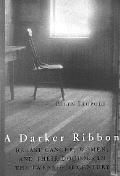In an effort to placate my inner 17-year-old, I’ve been watching the WB. Scarred by memories from my own youth of bad, boring TV shows with no real teens in them (remember Dallas? General Hospital?), I’m fascinated by all the series that cater to adolescent girls. Like everyone else, I watch them mainly to see what they have to say about sex.
Felicity, a “real-life” soap about a college freshman, has a message our feminist mothers should love: Sex is a healthy developmental stage. For Felicity, sex—she pronounces it primly, like “socks” with an “e”—is an age-appropriate toy, and she plays with it in age-appropriate ways. Here’s how Felicity seduces her boyfriend: She knocks at his door, her planner in hand. “Do you want to have secks?” she beams at him, like a Girl Scout earning a coveted badge. Then she pencils him in.
In an earlier scene, Felicity browses a bookstore, loudly and brightly asking the clerk for books about the dreaded “s” word. Felicity has determined that it’s time for her to learn sex, and she tackles the job with A-student earnestness. Why shouldn’t she speak up at the bookstore? Sex is natural and healthy. It’s only responsible for a young woman to learn about it before she schedules her first playdate.
This is The World According to Women’s Health Pamphlets, and to see it on-screen provokes a painful ambivalence. Felicity fans can object that the show is “true to life,” that it grapples with “real issues” in an honest, “empowering” way. That’s just the problem: The pamphlets describe life as somebody thinks it should be, not as it is. Every scrape Felicity and her friends get into has an easy, expert answer. Should Ben admit that he has a gambling problem? Should Felicity fix Ben’s paper—without his permission? Should Julie be angry with herself or with the boy who raped her? Their problems are no-brainers, and the way the characters go through their inevitable paces seems by the book, a little soulless.
I feel more at home in the monster-infested alleys of Buffy the Vampire Slayer, which rings true in a way the “realistic” teen shows never quite manage. In Buffy’s world, adults are a scurvy bunch. After age 20, demons are common, courage and decency are rare. The school counselor isn’t god; in fact, he’s easy prey for a supernaturally troubled kid. The mayor is some kind of warlock. The principal is human, but a Nazi at heart. Mothers may be caring (or not), but they really don’t understand, and they can’t make it better. All of this is very much the way I remember it.
Likewise, sex on Buffy is something a lot more interesting than a developmental stage. For Felicity and, no doubt, many real teens, a major incentive to have sex is simply to prove that you’re normal, to be accepted. Romantics, on the other hand, believe their desires make them differ- ent. They long for unique, deathless loves, not Mr. Appropriate. Felicity doesn’t suffer from many romantic notions; she weighs the merits of two suitors like an indecisive Ikea shopper. But Buffy, for all its witty back talk (it’s one of the best-written shows on TV), has a heart that bleeds.
For those who don’t know the story, Buffy is a vampire slayer in love with a vampire. The vamp in question is unusually good. He even has a human soul. But he’ll lose it if he ever enjoys a moment of perfect happiness on this earth. Buffy doesn’t need a book to tell her that “perfect happiness” is spelled with three letters and feels incredible. Like a Bront련eroine, she has a heroic instinct for passion. She longs for a deep connection with someone so radically other that their union would violate cosmic laws.
To their credit, Buffy’s writers refuse to simplify her desire into a wholly good or bad thing. Sex on Buffy is a satisfyingly dense mystery, a paradox too murky to be spelled out in a pamphlet.
More sex education:





